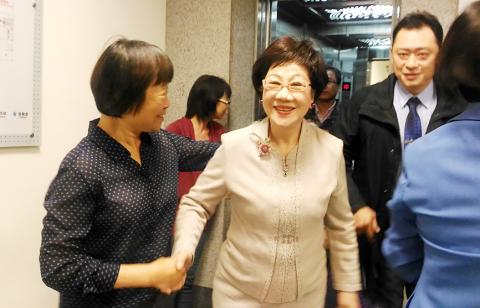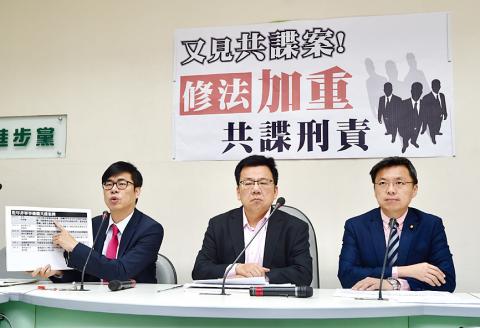A former National Security Bureau agent responsible for protecting former vice president Annette Lu (呂秀蓮) was detained on suspicion of espionage, prompting lawmakers to call for increased penalties for people caught spying for China.
Major Wang Hung-ju (王鴻儒), a former agent of the Special Service Command Center, was arrested on Monday for allegedly attempting to develop a spy network for China.
Wang allegedly attempted to recruit a Military Police Command intelligence officer surnamed Tseng (曾) to gather information about operations in exchange for a large cash payment and safe relocation to China if Tseng was exposed. Tseng rejected the offer.

Photo: Tsai Wen-chu, Taipei Times
Wang’s activity was discovered by the Ministry of Justice Investigation Bureau during a probe into Taiwanese businessman Ho Chih-chiang (何志強), who in 2010 was sentenced to 14 months in prison for attempting to recruit a security bureau official to collect information about overseas national security officials; the security bureau’s satellite communication system; Taiwan’s Japan policy and “secret diplomacy”; the Tibetan independence movement; and Falun Gong activities.
Wang, a former military police officer, was transferred to the security bureau’s special service unit in 2002 to protect Lu.
He retired in 2003 and was allegedly recruited by Chinese intelligence operatives in 2009.

Photo: Chien Jung-fong, Taipei Times
Ministry of National Defense spokesman Major General Chen Chung-chi (陳中吉) yesterday said that no active military personnel are involved in Wang’s espionage ring.
The ministry has counterintelligence measures in place and warns active and soon-to-be-retired soldiers and officers against spying for China, he said.
The Democratic Progressive Party (DPP) legislative caucus called for increased penalties for people caught spying for China, as offenders are handed moderate prison terms.
Among those convicted of Chinese espionage in recent years, former navy lieutenants Chien Ching-kuo (錢經國) and Lu Chun-chun (盧俊均) were sentenced to 10 months in prison in 2014, while last year former Chinese People’s Liberation Army officer Zheng Xiaojiang (鎮小江) and retired Republic of China Army major general Hsu Nai-chuan (許乃權) were sentenced to a four-year and a two-year-and-10-month prison term respectively.
“Those were cases that caused a national uproar, but only lenient punishments were given,” DPP Legislator Chen Chi-mai (陳其邁) said.
The Criminal Code stipulates a prison sentence of three to 10 years for people disclosing national secrets to a foreign state, but China is not seen as a foreign state due to the complicated cross-strait political relationship, DPP Legislator Chao Tien-lin (趙天麟) said.
Spying for China is punishable according to the National Security Act (國家安全法), which stipulates a prison sentence of one to seven years.
“Chinese spies and Taiwanese spying for China have exploited the legal inconsistency to avoid heavier criminal sentences,” Chao said.
Chao proposed amending the National Security Act to increase the prison sentence for espionage to three to 10 years.
A preliminary review of the proposal was completed in the previous legislative session.
Chao and Chen Chi-mai called on the legislature to finalize the review this session to ensure that Chinese spies would be duly punished.

People can preregister to receive their NT$10,000 (US$325) cash distributed from the central government on Nov. 5 after President William Lai (賴清德) yesterday signed the Special Budget for Strengthening Economic, Social and National Security Resilience, the Executive Yuan told a news conference last night. The special budget, passed by the Legislative Yuan on Friday last week with a cash handout budget of NT$236 billion, was officially submitted to the Executive Yuan and the Presidential Office yesterday afternoon. People can register through the official Web site at https://10000.gov.tw to have the funds deposited into their bank accounts, withdraw the funds at automated teller

PEACE AND STABILITY: Maintaining the cross-strait ‘status quo’ has long been the government’s position, the Ministry of Foreign Affairs said Taiwan is committed to maintaining the cross-strait “status quo” and seeks no escalation of tensions, the Ministry of Foreign Affairs (MOFA) said yesterday, rebutting a Time magazine opinion piece that described President William Lai (賴清德) as a “reckless leader.” The article, titled “The US Must Beware of Taiwan’s Reckless Leader,” was written by Lyle Goldstein, director of the Asia Program at the Washington-based Defense Priorities think tank. Goldstein wrote that Taiwan is “the world’s most dangerous flashpoint” amid ongoing conflicts in the Middle East and Russia’s invasion of Ukraine. He said that the situation in the Taiwan Strait has become less stable

CONCESSION: A Shin Kong official said that the firm was ‘willing to contribute’ to the nation, as the move would enable Nvidia Crop to build its headquarters in Taiwan Shin Kong Life Insurance Co (新光人壽) yesterday said it would relinquish land-use rights, or known as surface rights, for two plots in Taipei’s Beitou District (北投), paving the way for Nvidia Corp to expand its office footprint in Taiwan. The insurer said it made the decision “in the interest of the nation’s greater good” and would not seek compensation from taxpayers for potential future losses, calling the move a gesture to resolve a months-long impasse among the insurer, the Taipei City Government and the US chip giant. “The decision was made on the condition that the Taipei City Government reimburses the related

FRESH LOOK: A committee would gather expert and public input on the themes and visual motifs that would appear on the notes, the central bank governor said The central bank has launched a comprehensive redesign of New Taiwan dollar banknotes to enhance anti-counterfeiting measures, improve accessibility and align the bills with global sustainability standards, Governor Yang Chin-long (楊金龍) told a meeting of the legislature’s Finance Committee yesterday. The overhaul would affect all five denominations — NT$100, NT$200, NT$500, NT$1,000 and NT$2,000 notes — but not coins, Yang said. It would be the first major update to the banknotes in 24 years, as the current series, introduced in 2001, has remained in circulation amid rapid advances in printing technology and security standards. “Updating the notes is essential to safeguard the integrity